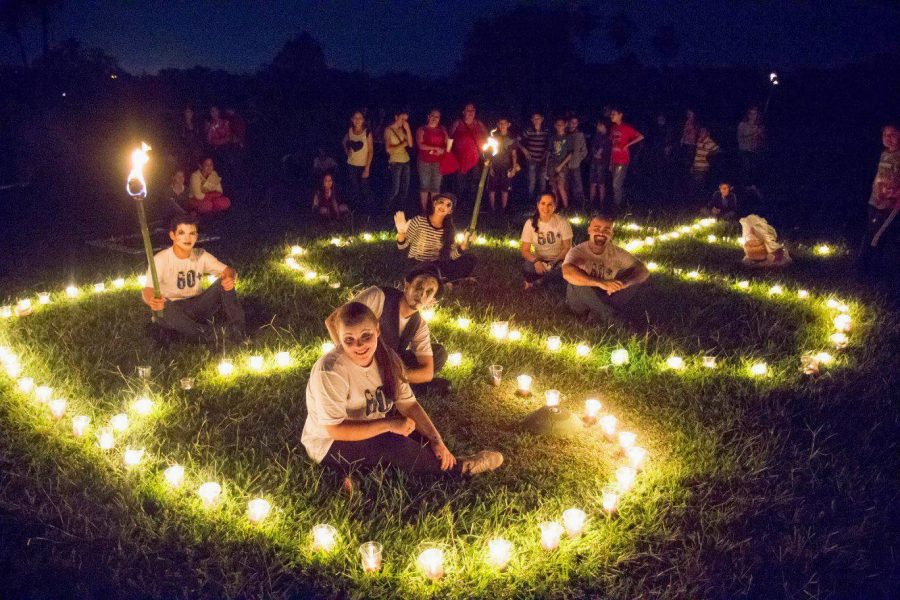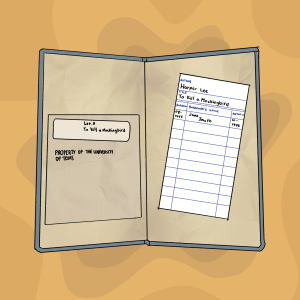UT students can start volunteering journey through Peace Corps Prep program
Joshua Castro and other community members sit inside the iconic 60+ symbol for Earth Hour.
March 1, 2022
In 2022, the Peace Corps commemorates 61 years of international peace, friendship, and service. Over 240,000 Americans have served in more than 140 nations. Now, UT students can start their journey through the Peace Corps Prep program.
The Peace Corps ranked UT Austin No. 1 in Texas and No. 13 among large size schools on the Peace Corps’ 2020 list of colleges and universities that produce volunteers. Since the creation of the Peace Corps, 1,913 alumni from UT-Austin have joined the Peace Corps. The new certificate program, called Peace Corps Prep, centers on one empowering question: How can you be the best Peace Corps Volunteer you can be?
Completion of the program earns you a certificate from the Peace Corps and a competitive edge when applying for Peace Corps service. The program integrates coursework with hands-on experience and professional development to help you build four competencies:
- Sector-specific skills
- Foreign language proficiency
- Intercultural competence
- Professional savvy and leadership
Michael Houang, Program Specialist with Peace Corps’ Office of University Programs, said the Peace Corps Prep program is in high demand at UT Austin. In 2019, there were only 35 students in the UT program, but in 2021, it grew to 75. Houang, a returned volunteer, also encouraged participation in the program because it can make students more competitive for the global job network.
“Students come out of the program feeling like they have a better understanding of how they want to use their interpersonal skills on the global stage,” Houang said. “As we move toward a technologically connected, globalized world, we’re going to see our borders kind of start to melt together. Not our physical borders, but our interspatial borders, we’re going to be connecting with someone across the globe much more frequently and in a much more closely connected manner.”
Houang recommended that interested students reach out to the Peace Corps prep coordinator at UT Austin, Michael Mosser, who can give them more information about how the program can fit into their degree plan.
“Ask (him) for more information on this program, because it could open up the door right into that pathway,” Houang said.
The Peace Corps Prep program corresponds with the Peace Corps’ application process, which lets you choose where you want to go and what you want to do during your volunteer service. You can first explore and discover the Peace Corps Prep opportunities that excite you, and what skills you will need to be a competitive applicant for those positions. Once enrolled in Peace Corps Prep, you can shape your curriculum around those requirements.
Maritza De la Peña, UT alumna and Peace Corps Strategic Campus Recruiter at UT, said, “the program builds off UT’s motto, “What starts here changes the world.”
“At UT, you’ve worked hard to gain knowledge, skills, and experiences in your major; by joining the Peace Corps, you have an opportunity to be able to take everything you’ve learned and further cultivate all of this, develop your skill set, and maybe even find something new within yourself while walking alongside other motivated individuals in communities abroad, working on projects to bring about sustainable change,” said De la Peña. “I, myself, am a UT Alumna and I just wanted to help people. By joining the Peace Corps, I was able to apply things I learned as a student at UT and watch them manifest into lasting change in the community I lived in.”
De la Peña will also host a special event, Story Slam: Making a Difference Around the World at the Cactus Café on March 3rd, where you can hear stories about challenging, rewarding, and inspirational moments from volunteers.
Although not part of the event, Joshua Castro, a former volunteer and public affairs specialist for the Peace Corps, shared his story with us. Joshua started his journey with the Peace Corps as an environmental educator in Paraguay. “I went into the Peace Corps a few years after graduating. It was a lifelong goal of mine and I hoped it would also open doors for me career-wise.
“As a first-generation American and first-generation college student, there’s pressure to succeed, and I wasn’t able to before like I am now. I wasn’t able to help my family before financially like I am now. That means everything to me. That came from the Peace Corps.”
While volunteering at a UNESCO World Heritage site in Paraguay, Castro experienced his “wow moment,” he said, when he realized he was making a real impact. He helped host an Earth Hour celebration at the Jesuit Mission in the pueblo where he was a volunteer. Students were involved in making candles and torches and different environmental organizations were invited to speak.
“I remember being emotional before the presentation, thinking how a year before there was not a single person sitting there in the first 45 minutes and now we’re 15 minutes in and there’s over 100 people here that can’t even fit in the room,” Castro said. “It was such a touching moment that the community was so involved. They loved it. They promoted it and they still did it the year after I left which is what the Peace Corps is about. We want sustainability. We want to work with the community towards things that are important to them.”
Castro finished by saying, “The Peace Corps challenged me every single day. And because of that, I believe it was one of the most profound experiences of my life.”
Students interested in learning more about the Peace Corps can reach out to the UT Austin Campus Recruiter at peacecorps@austin.utexas.edu to set up a time to meet and discuss options within the Peace Corps.












